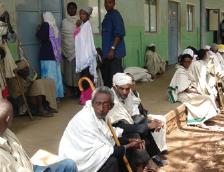 UK optometrist Gemma Peters reports on an exciting project in Ethiopia and offers readers the chance of taking part
UK optometrist Gemma Peters reports on an exciting project in Ethiopia and offers readers the chance of taking part
In the highlands of Ethiopia, exciting things are happening in the field of optometry.
Uncorrected refractive error has recently been recognised by the World Health Organisation (WHO) as an important cause of avoidable blindness and low vision. Hence, in the WHO initiative Vision 2020, it has been identified as one of the priority targets for intervention.In Ethiopia, with a population of 76 million, it is estimated that at least one million people suffer with blindness or low vision. But 80 per cent of this blindness is either treatable or preventable. In Ethiopia, uncorrected refractive error is the third major cause of avoidable blindness, following cataract and trachoma.The profession of optometry, however, is almost non-existent in Ethiopia. Consequently, the small number of Ethiopian ophthalmologists spends time managing patients with refractive error, while their time could be more effectively utilised performing surgical procedures such as cataract surgery. Plus, with the majority of Ethiopian ophthalmologists working in the capital Addis Ababa, this refraction service is only available to a very small percentage of the mostly rural and poor population.Optometrists would be an invaluable addition to the country’s team of eye care professionals. The charity ORBIS International-Ethiopia has recognised this, and with the targets of Vision 2020 in mind, has set up a project to establish formal optometry training programmes at the university level.
Register now to continue reading
Thank you for visiting Optician Online. Register now to access up to 10 news and opinion articles a month.
Register
Already have an account? Sign in here
